Devil on My Trail
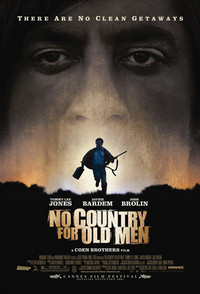 My first thought after watching Joel and Ethan Coen’s No Country for Old Men – amid groans from others in the theater – was that I understood why some people hate it.
My first thought after watching Joel and Ethan Coen’s No Country for Old Men – amid groans from others in the theater – was that I understood why some people hate it.
 My first thought after watching Joel and Ethan Coen’s No Country for Old Men – amid groans from others in the theater – was that I understood why some people hate it.
My first thought after watching Joel and Ethan Coen’s No Country for Old Men – amid groans from others in the theater – was that I understood why some people hate it.
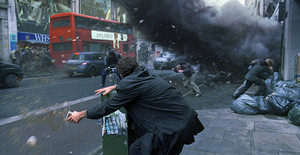 In an admiring but fundamentally dismissive review, Matt Zoller Seitz argues that Children of Men’s subject matter necessitates a treatment more rigorous and pointed. The implication is that movies that recall real-world horrors have some responsibility to them, and I don’t necessarily buy that. A film shouldn’t trivialize suffering, but serious politics (and shameful history) shouldn’t be off-limits for entertainments. Plus: Casino Royale and Borat.
In an admiring but fundamentally dismissive review, Matt Zoller Seitz argues that Children of Men’s subject matter necessitates a treatment more rigorous and pointed. The implication is that movies that recall real-world horrors have some responsibility to them, and I don’t necessarily buy that. A film shouldn’t trivialize suffering, but serious politics (and shameful history) shouldn’t be off-limits for entertainments. Plus: Casino Royale and Borat.
 I was complaining to a friend about the final half-hour of Martin Scorsese’s The Departed, and he suggested I was looking at it all wrong. If you see the movie as a serious cop-and-gangster thriller, it does fall apart, with its escalating body count and that blunt-instrument final shot, juxtaposing unattainable dreams with vermin. But if you see it as a comedy … .
I was complaining to a friend about the final half-hour of Martin Scorsese’s The Departed, and he suggested I was looking at it all wrong. If you see the movie as a serious cop-and-gangster thriller, it does fall apart, with its escalating body count and that blunt-instrument final shot, juxtaposing unattainable dreams with vermin. But if you see it as a comedy … .
 Neil Marshall’s The Descent approaches being a perfect terror movie. And because terror is unique to cinema among art forms – it doesn’t translate well to the page because the narrative has to slow down for the reader, and it doesn’t translate at all to any other medium – The Descent approaches being a perfect movie, period.
Neil Marshall’s The Descent approaches being a perfect terror movie. And because terror is unique to cinema among art forms – it doesn’t translate well to the page because the narrative has to slow down for the reader, and it doesn’t translate at all to any other medium – The Descent approaches being a perfect movie, period.
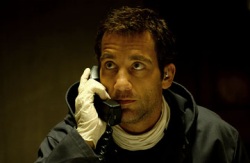 In Inside Man, director Spike Lee and screenwriter Russell Gerwitz announce early that nothing too traumatic will befall any of the characters, and then they keep that promise; they implicitly give the audience permission to enjoy the film.
In Inside Man, director Spike Lee and screenwriter Russell Gerwitz announce early that nothing too traumatic will befall any of the characters, and then they keep that promise; they implicitly give the audience permission to enjoy the film.
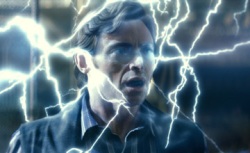 The disappointment of Christopher Nolan’s enormously entertaining – and slyly provocative – The Prestige comes in its closing minutes, when it adds a fourth act to its illusion: the final reveal. As any magician will tell you – as the movie itself reminds the audience – knowledge of the secret robs the trick of its power and allure.
The disappointment of Christopher Nolan’s enormously entertaining – and slyly provocative – The Prestige comes in its closing minutes, when it adds a fourth act to its illusion: the final reveal. As any magician will tell you – as the movie itself reminds the audience – knowledge of the secret robs the trick of its power and allure.
 The true subject of Albert Brooks’ Looking for Comedy in the Muslim World is the fact that most people don’t find Albert Brooks funny. That sounds sour, and it sells the movie short, but it’s fundamentally true. Plus: V for Vendetta.
The true subject of Albert Brooks’ Looking for Comedy in the Muslim World is the fact that most people don’t find Albert Brooks funny. That sounds sour, and it sells the movie short, but it’s fundamentally true. Plus: V for Vendetta.
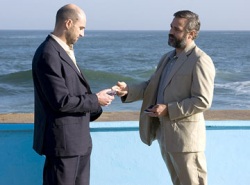 The film’s subject makes it bluntly political, yet Syriana nearly demands multiple viewings to even understand its plot, let alone its meanings. It is intended to illuminate that the business of oil is a dirty one, yet even people who pay close attention to the movie will come away from it more confused than enlightened.
The film’s subject makes it bluntly political, yet Syriana nearly demands multiple viewings to even understand its plot, let alone its meanings. It is intended to illuminate that the business of oil is a dirty one, yet even people who pay close attention to the movie will come away from it more confused than enlightened.
Afraid of the Dark, Mark Peploe’s smart but minor psychological thriller, comprises two movies. One of these stories represents reality, and one is fantasy, and it takes no genius to figure out which is which. Thankfully, the film doesn’t try to fool the audience.
A History of Violence is a bizarre, challenging film dressed up as a mainstream entertainment, a subversive work bordering on parody yet also deadly earnest. The movie confirms that David Cronenberg has grown into one of cinema’s most sophisticated, rigorous, and probing filmmakers.